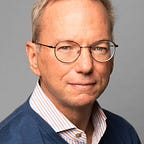Uniting Humanity
Astrophysicist, author, and television host Neil deGrasse Tyson helps me close out the first season of Reimagine by sharing his cosmic view of life and why understanding science is key to building back a better world.
Science has transformed every element of our lives, from our health to the food we eat to the way we communicate; humanity is undeniably better off thanks to science. The scientific process allows us to rigorously produce reliable knowledge that is invaluable to our modern world. But, what happens when the knowledge derived by science is not understood or — even worse — not trusted? As the pandemic has shown, when we disregard science, we create a vacuum that fills with misinformation, fear, and propaganda and leads to a more dangerous and divided world.
As we reimagine our lives after COVID, I don’t want a world where everyone blindly trusts anything anyone calling themselves a scientist says. Rather, I want a world where everyone understands and appreciates science as a process for overcoming our own individual biases and limitations and where scientific literacy leads to a more curious, more informed, and more empathetic society.
That’s why I invited astrophysicist Neil deGrasse Tyson onto my podcast, Reimagine, to discuss why so many people have turned their back on science at a time of real crisis and how we can improve the situation.
As Dr. Tyson pointed out in our discussion:
“I don’t think we’ve taught people science in a way where they view it as a path to objective truths in this world. If they did, they would see science as this unique enterprise, different from everything else they’ve ever studied.”
Dr. Tyson represents the best of the scientific field: a curious mind, a sharp communicator, and a humble human. If our experience fighting COVID-19 has taught us anything, it’s that it’s time to reaffirm our faith and trust in science. We’ve done the opposite in our battle with the novel coronavirus, and it has caused needless damage to families, communities, and the economy.
We’re on the cusp of an exciting new era in science. New tools in computing, such as artificial intelligence, mean that we can simulate the natural world at an unprecedented level, speeding up our experiments and our knowledge collection. These innovations will lead to enormous progress in almost every area of our lives.
When I look at my own life, I owe so much of what I’ve been able to accomplish to the principles of science. One of our main goals when launching Schmidt Futures was to reinvest back into science for the next generation. Without science, there would be no biologists, chemists, material science, and astronomers. By supporting science now, we’re supporting fundamental discoveries that will create trillion dollar industries in the next 10 to 20 years. And, in the shorter-term, a chance to return to life that’s not dictated by a virus.
Dr. Tyson made a particularly memorable point in our conversation that I think we would all do well to carry with us in the aftermath of this pandemic:
“COVID doesn’t care about what tribe you belong to. It doesn’t care who you worship, or who you have sex with, or what your skin color is, or what side of a line in the sand you were born on. It infects you because you are human. Our greatest enemy this year, the greatest enemy in decades, is something that sees all humans as one. Is that what we needed to get that lesson? Did we need a lethal virus to tell us that we’re all the same? Maybe so, unfortunately, but yeah. Okay, so now let’s take a step back. The virus sees us all as one. How come we don’t? And in that light, can we celebrate what is different rather than tribalize over what’s different?”
I hope for all of our sakes that COVID becomes a cause to recognize our common humanity — that, as Dr. Tyson says, we learn to celebrate rather than tribalize our differences. Every human deserves a chance for life without the virus. Every human deserves a chance to rise to their full potential and help improve the world. This is our opportunity to use science as a framework to help us renounce unimportant differences, rise above this difficult time, and embrace our shared humanity.
